The Intel Kaby Lake-X i7 7740X and i5 7640X Review: The New Single-Threaded Champion, OC to 5GHz
by Ian Cutress on July 24, 2017 8:30 AM EST- Posted in
- CPUs
- Intel
- Kaby Lake
- X299
- Basin Falls
- Kaby Lake-X
- i7-7740X
- i5-7640X
Civilization 6
First up in our CPU gaming tests is Civilization 6. Originally penned by Sid Meier and his team, the Civ series of turn-based strategy games are a cult classic, and many an excuse for an all-nighter trying to get Gandhi to declare war on you due to an integer overflow. Truth be told I never actually played the first version, but every edition from the second to the sixth, including the fourth as voiced by the late Leonard Nimoy, it a game that is easy to pick up, but hard to master.
Benchmarking Civilization has always been somewhat of an oxymoron – for a turn based strategy game, the frame rate is not necessarily the important thing here and even in the right mood, something as low as 5 frames per second can be enough. With Civilization 6 however, Firaxis went hardcore on visual fidelity, trying to pull you into the game. As a result, Civilization can taxing on graphics and CPUs as we crank up the details, especially in DirectX 12.
Perhaps a more poignant benchmark would be during the late game, when in the older versions of Civilization it could take 20 minutes to cycle around the AI players before the human regained control. The new version of Civilization has an integrated ‘AI Benchmark’, although it is not currently part of our benchmark portfolio yet, due to technical reasons which we are trying to solve. Instead, we run the graphics test, which provides an example of a mid-game setup at our settings.
At both 1920x1080 and 4K resolutions, we run the same settings. Civilization 6 has sliders for MSAA, Performance Impact and Memory Impact. The latter two refer to detail and texture size respectively, and are rated between 0 (lowest) to 5 (extreme). We run our Civ6 benchmark in position four for performance (ultra) and 0 on memory, with MSAA set to 2x.
For reviews where we include 8K and 16K benchmarks (Civ6 allows us to benchmark extreme resolutions on any monitor) on our GTX 1080, we run the 8K tests similar to the 4K tests, but the 16K tests are set to the lowest option for Performance.
For all our results, we show the average frame rate at 1080p first. Mouse over the other graphs underneath to see 99th percentile frame rates and 'Time Under' graphs, as well as results for other resolutions. All of our benchmark results can also be found in our benchmark engine, Bench.
MSI GTX 1080 Gaming 8G Performance
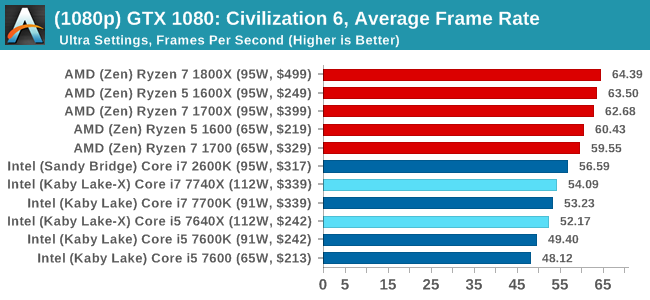
1080p

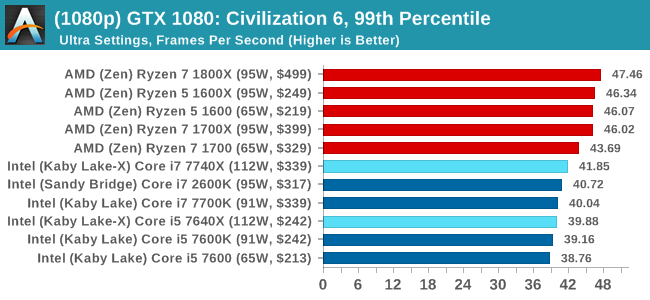
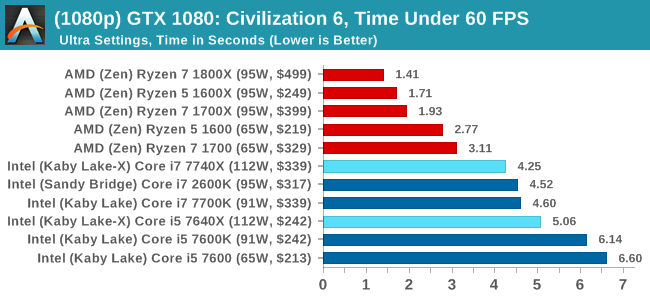
4K
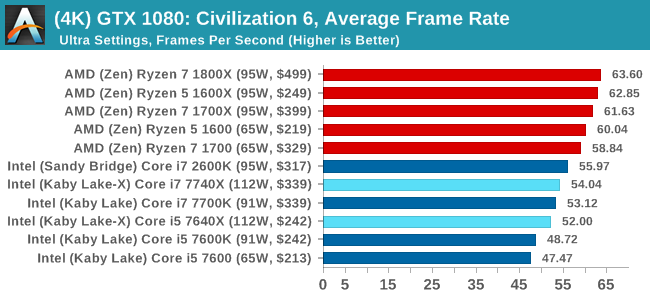
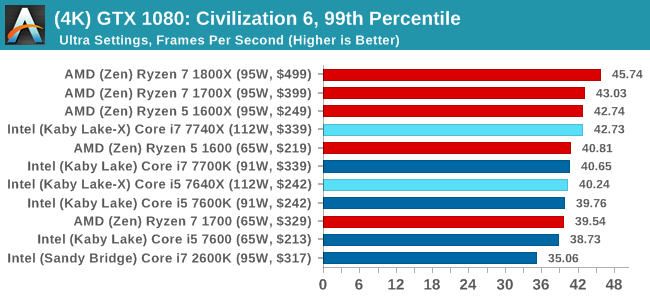
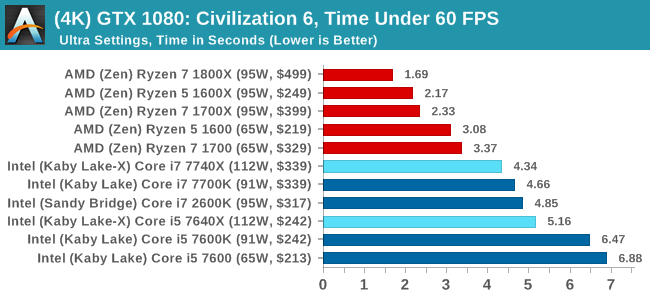
8K
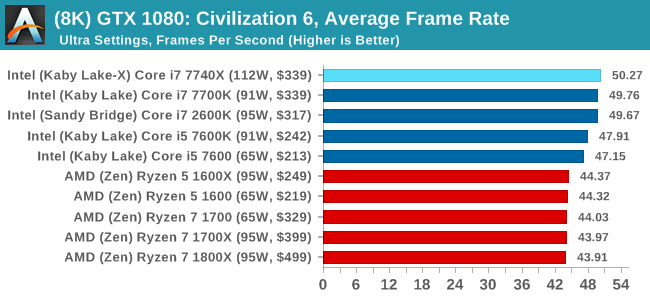
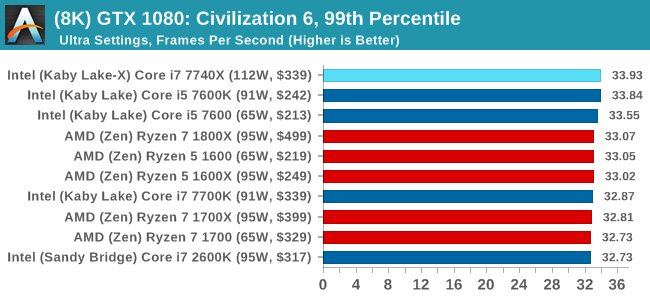
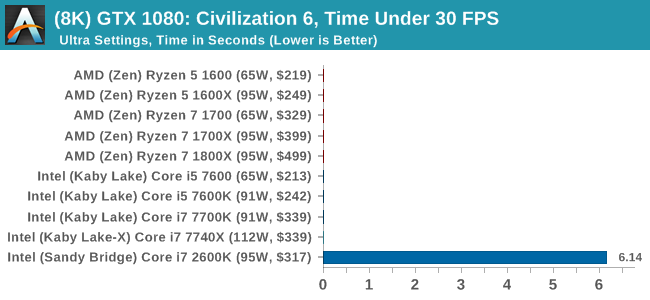
16K
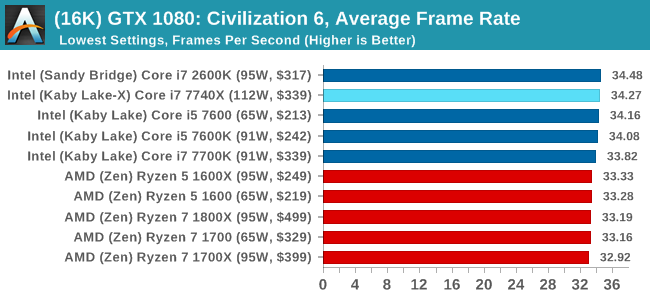
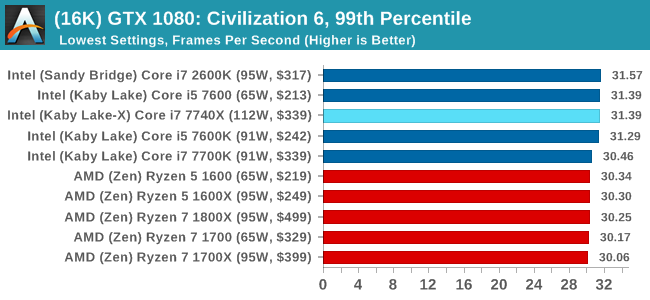
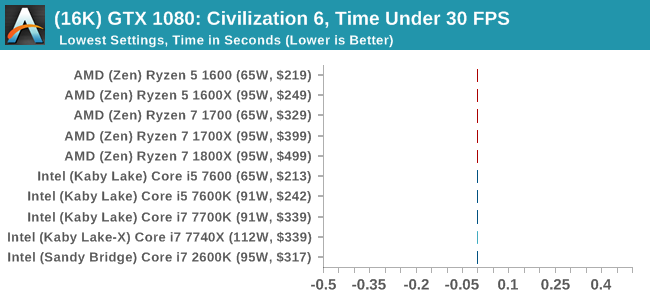
ASUS GTX 1060 Strix 6GB Performance

1080p

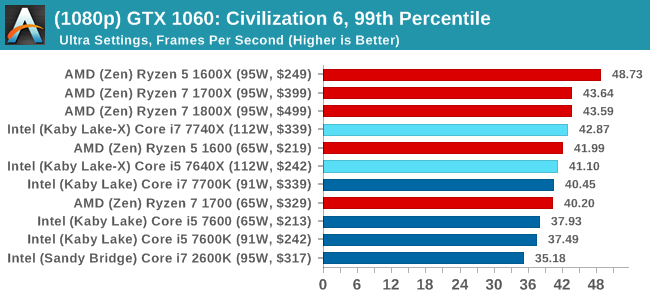
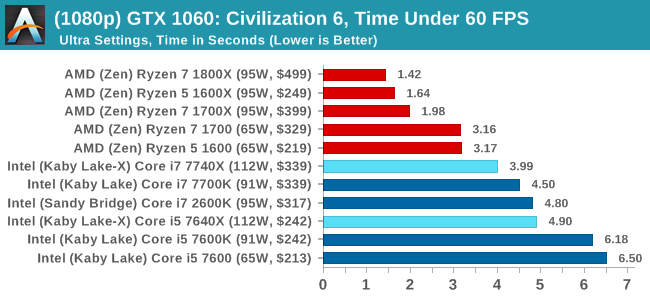
4K
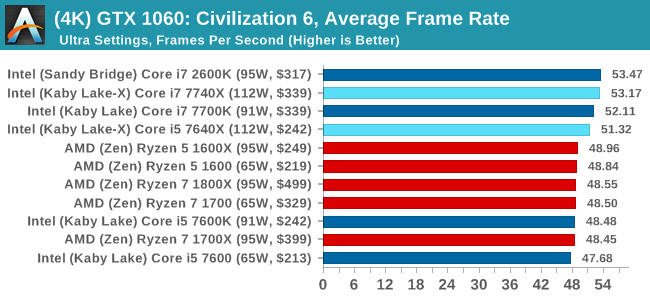
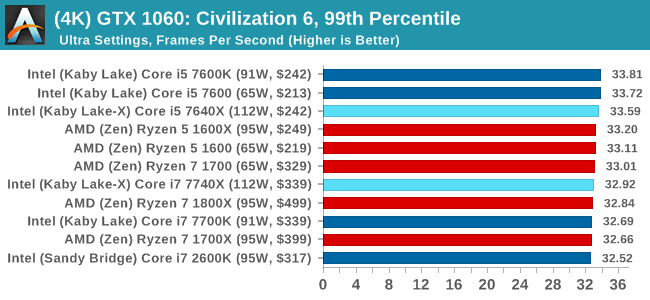
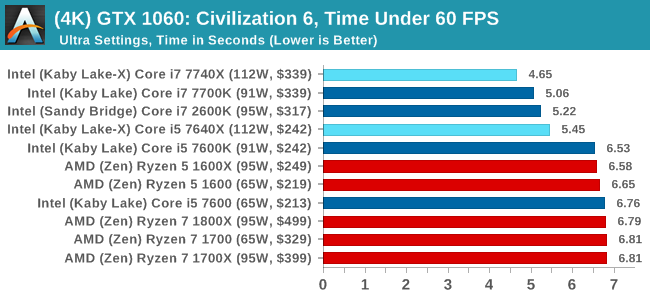
Sapphire R9 Fury 4GB Performance
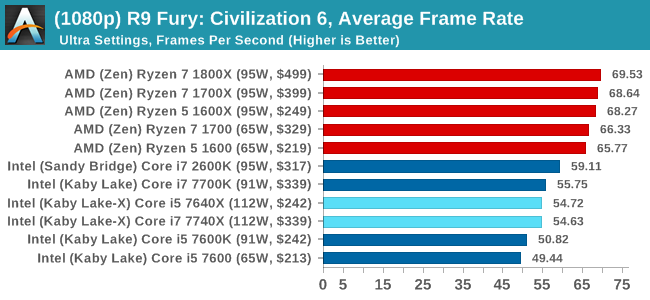
1080p

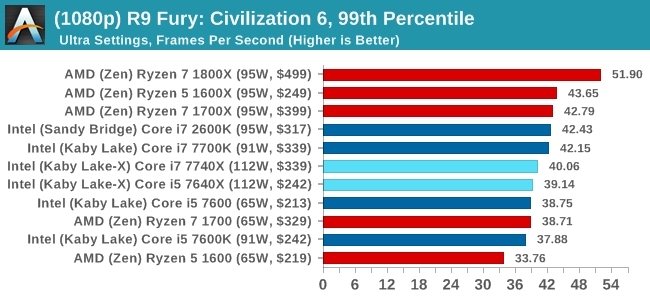
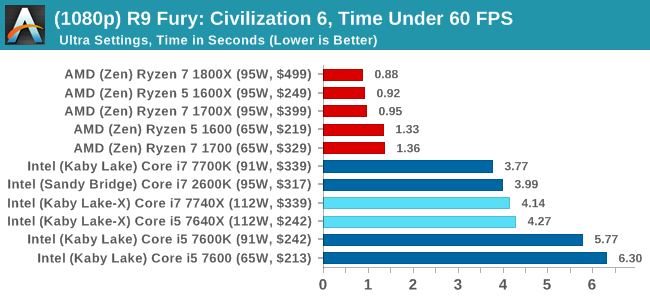
4K
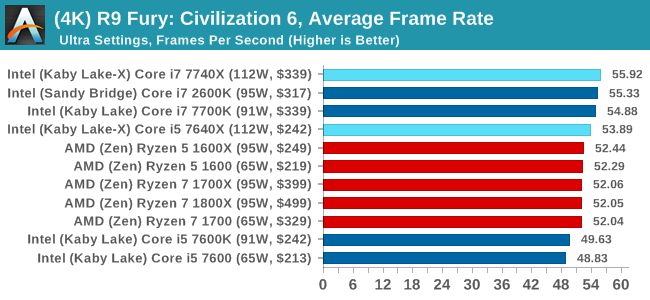
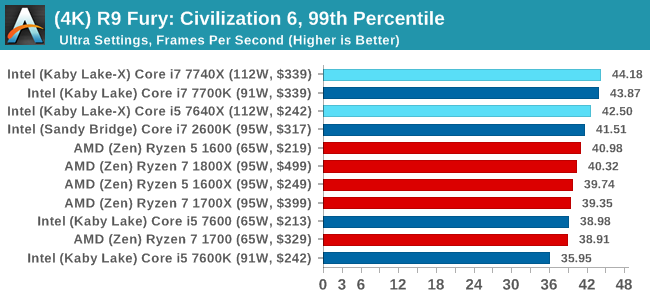
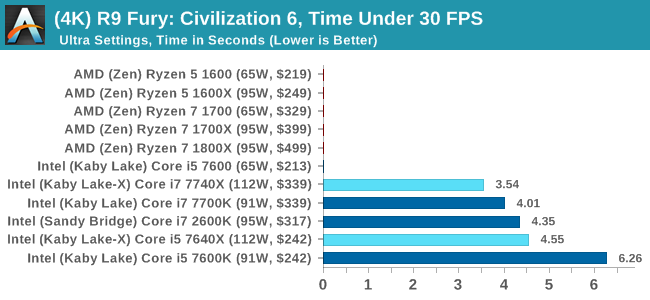
Sapphire RX 480 8GB Performance
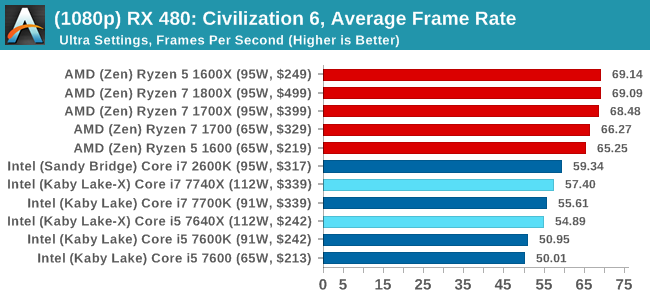
1080p

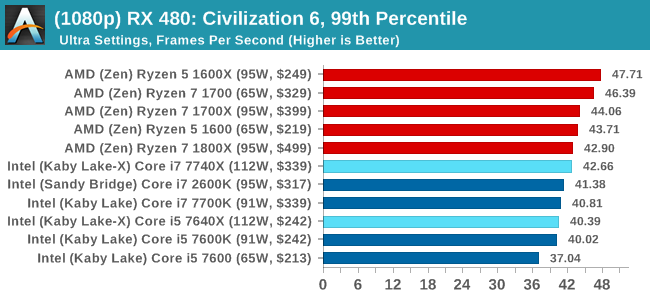
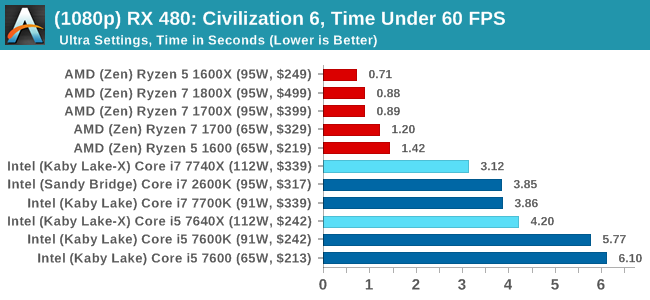
4K
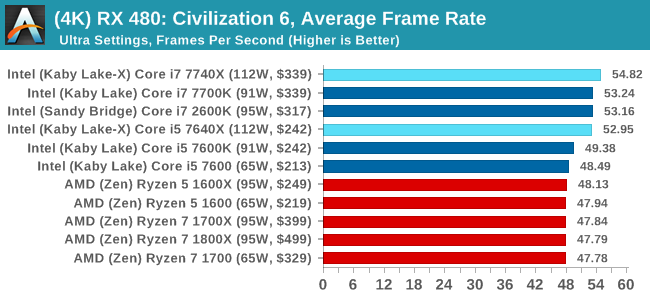
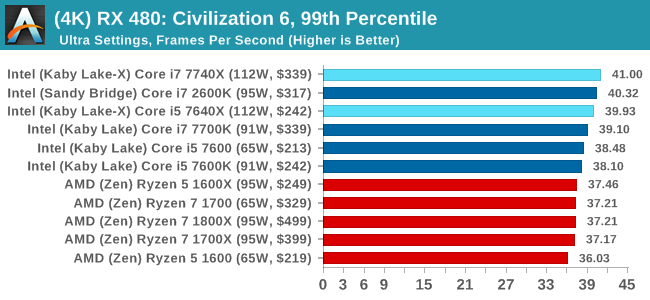
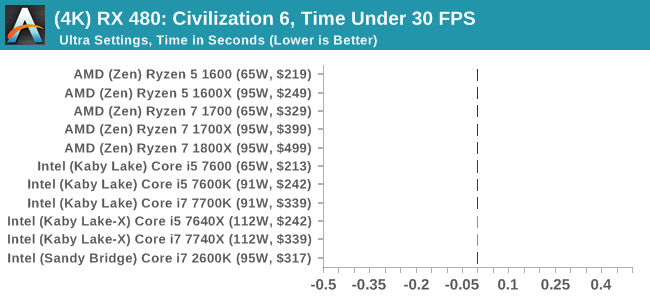
Civilization 6 Conclusion
In all our testing scenarios, AMD wins at 1080p with minor margins on the frame rates but considerable gains in the time under analysis. Intel pushes ahead in almost all of the 4K results, except with the time under analysis at 4K using an R9 Fury, perhaps indicating that AMD is offering a steadier range in its frame rate, despite the average being lower.



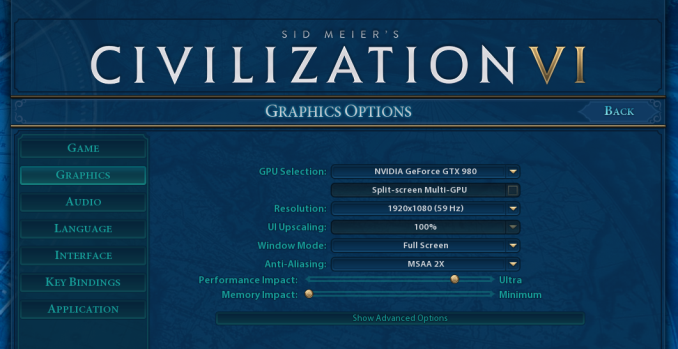








176 Comments
View All Comments
Alistair - Monday, July 24, 2017 - link
I look at it this way: in 2016 I bought a 6600k for $350 CAD. In 2017 I bought a Ryzen 1700 for $350 CAD. Overall speed increase 240%. So AMD delivered 240 percent more performance at the same price in one year. Intel continues to deliver less than 10 percent per dollar. I could care less if the single performance is the same.Call me next time Intel releases a chip a year later that is 240 percent faster for the same price.
Hurr Durr - Monday, July 24, 2017 - link
So you bought yourself inferior IPC and a sad attempt at ameliorating it by piling up cores, and now have to cope with this through wishful thinking of never materializing performance percents. Classic AMD victim behavior.Alistair - Monday, July 24, 2017 - link
First of all, stop using IPC, an expression you don't understand. Use single core performance. In almost every single benchmark I see dramatic speed improvements. I'm comparing the i5 with a Ryzen 1700 as they were the same cost. People harping over the i7-7700k apparantly didn't notice the 1700 selling for as low as $279 USD.Also get higher fps in almost every single game (Mass Effect Andromeda, Civilization and Overwatch in particular).
Alistair - Tuesday, July 25, 2017 - link
I have tremendous respect for Ian, whose knowledge and integrity is of the highest order. I just think some of his words in this review lose the plot. As he said, "it would appear Intel has an uphill struggle to convince users that Kaby Lake-X is worth the investment". He should have emphasized that a little more.In Canada, Ryzen 1700 plus motherboard = $450. i5 (not i7) plus motherboard is $600. Yes, $150 dollars more!
Intel has 20 percent faster single core performance and yet Ryzen is 2.4 times (+140 percent) faster overall... Numbers should speak for themselves if you don't lose the plot. I agree single threaded performance is very important when the divergence is large, such as Apple's A10 vs Snapdragon 835, or the old Bulldozer. But the single threaded gap has mostly closed and a yawning gulf has opened up in total price/performance. Story of the year!
Hurr Durr - Tuesday, July 25, 2017 - link
Extolling price slashing right after launch, boy you`re on a roll today.silverblue - Tuesday, July 25, 2017 - link
I think you should prove why you think Intel is the superior buy, instead of just trolling and not actually providing any rationale behind your "arguments".On Amazon.co.uk right now, there are four Ryzen and one FX CPU in the top 10. Here's the list (some of the recommended retail price values are missing or a bit - in the case of the 8350 - misleading):
1) i7-7700K £308.00; RRP £415.99
2) R5 1600 £189.19; RRP £219.95
3) R7 1700 £272.89; RRP £315.95
4) i5-7600K £219.99; RRP £?
5) i5-7500 £173.00; RRP £?
6) FX-8350 £105.50; RRP £128.09
7) i5-6500 £175.09; RRP £?
8) R5 1500X £165.99; RRP £189.98
9) Pentium G4400 £48.90; RRP £?
10) R5 1600X £215.79; RRP £249.99
There must be a ton of stupid people buying CPUs now then, or perhaps they just prefer solder as their thermal interface material of choice.
Advantages for Intel right now: clock speed; overclocking headroom past 4 GHz; iGPU (not -X CPUs)
Disadvantages for Intel right now: price; limited availability of G4560; feature segmentation (well, that's always been a factor); overall platform cost
An AMD CPU would probably consume similar amounts of power if they could be pushed past 4.1GHz so I won't list that as a disadvantage for Intel, nor will I list Intel's generally inferior box coolers as not every AMD part comes with one to begin with.
The performance gap in single threaded workloads at the same clock speed has shrunk from 60%+ to about 10%, power consumption has tumbled, and it also looks like AMD scales better as more cores are added. Unless you're just playing old or unoptimised games, or work in a corporate environment where money is no object, I don't see how AMD wouldn't be a viable alternative. That's just me, though - I'm really looking forward to your reasons.
Gothmoth - Tuesday, July 25, 2017 - link
no first of = stop arguing with stupid trolls...prisonerX - Monday, July 24, 2017 - link
I can double my IPC by having another core. Are you really that dumb?Hurr Durr - Tuesday, July 25, 2017 - link
AMD victim calling anyone dumb is peak ironing. You guys are out in force today, does it really hurt so bad?wira123 - Tuesday, July 25, 2017 - link
yeah intel victim is in full force as well today, which is indeed ironic